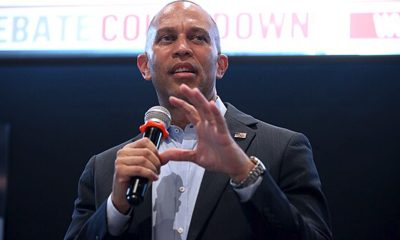Activism
With Union Contract OK’d, Moe’s Books Workers Get Improved Wages, Benefits
Despite some mixed feelings from workers about the owner’s reactions to the union, both workers and ownership expressed optimism about what they think the Moe’s Books union can do for the future of the four-story store with over 200,000 mostly used books. “If customers see the positive impact of shopping at independently owned stores that do all they can to support their workers,” said Moe’s Books owner, Doris Moskowitz, “then this agreement will only make Moe’s Books’ future stronger.”

By Zack Haber
Workers at Moe’s Books in Berkeley agreed to their first union contract with store ownership on November 23. The agreement has given them a $20 minimum wage, dental insurance, more paid vacation days, a new procedure for filing grievances, and job security protections.
“I think this is a good, solid contract, and a good starting point for improving worker/owner relations,” said Owen Hill, who’s worked at Moe’s for about 35 years. “I wish we had this 10 years ago, but better late than never.”
Moe’s Books owner, Doris Moskowitz, told this publication she’s happy with the contract as well.
“I feel great about the agreement,” said Moskowitz. “Supporting our workers is part of Moe’s 60-year legacy, and we are proud to continue in that tradition.”
In early March about 95% of eligible Moe’s workers agreed to form a union by joining with the Industrial Workers of the World (IWW). The move was part of a growth in bookstore unionization spurred by COVID-related issues.
Workers at Elliot Bay Book Company in Seattle and Bookshop Santa Cruz each formed unions in 2020. This year, bookstore unionization has expanded as workers at Printed Matter in New York City formed a union in October, while workers at three different Half Price Books locations in Minnesota are awaiting election results in mid-December to certify their unions.
Immediately after its formation, Moskowitz recognized Moe’s Books Union, but she had mixed feelings about it. In early April, she told Berkeleyside she “deeply respected” the workers’ decision to unionize but that the move had also left her “very sad and confused.” Following initial negotiations related to COVID safety measures, the union and Moskowitz began its first contract negotiations. In total, both sides came to 35 agreements during 16 bargaining sessions over eight months.
“The bargaining process was long, tiresome, and sometimes tense,” said Hill. “But mostly people were respectful and tried to come to an understanding.”
According to Bruce Valde, an organizer with the IWW who works with Moe’s Books Union, the eight months it took to agree to the contract was comparatively quick. In his experience, it usually takes workers and ownership a year to a year-and-a-half to agree to a first union contract. Valde called Moskowitz’s choice to immediately recognize the union “wise” and lauded the workers’ collaboration in clearly stating their requests.
“I think the workers diligence in actually forming our positions was excellent,” said Valde.
Since the new contract has passed, all union members will soon be getting a 10% raise in their salaries, or a $20 an hour wage if the 10% bump doesn’t already exceed that wage.
They’ll also get a 3% wage increase during the second and third year of the contract.
Additionally, the contract has stipulations related to respecting employees’ gender and gender expression. Harassment violations now specifically include ownership or management commenting in an ostracizing manner on workers’ gender expression, including clothing choices or hairstyles, or not making a concerted effort to correctly use workers’ pronouns.
While the union members unanimously agreed to the contract and Moskowitz told this publication “I feel like it is a win-win” situation, workers claimed along the way that the owner wasn’t always respectful of the union. In late September, union members and supporters held an informational picket at the store to support their demand for the $20 minimum wage that was eventually granted, but also to share information with the public about how they thought the owners were practicing “union busting.”
Around this time, the union filed unfair labor practice claims to the National Labor Relations Board, one of which was related to their accusation that Moskowitz was offering promotions for the sole purpose of removing people from the union by placing them in management positions.
Barry Bloom, who works as a book shipper, claimed Moskowitz asked him if he’d agree to be the supervisor of the shipping department, a position that would prevent him from joining in the union. He was the only member of the shipping department at the time, and she didn’t offer him a raise.
“My immediate reaction was to wonder ‘who would I be supervising?’” Bloom said. “I pretty much instantly saw it as a union-busting tactic.”
Moskowitz denied the accusation of union busting, saying, at the time “We have not made any job offer or offers of promotions in order to encourage any employee to break from their support of the union.”
Soon after agreeing to the new contract, Moskowitz taped a statement to the front window of the store, expressing that she was proud of the contract and Moe’s openness to organized labor. The statement, which was posted to Moe’s instagram and Facebook accounts, also encouraged other businesses, specifically large bookstores, to allow workplace organizing.
“If a small, independent used-book seller can accomplish this while keeping the doors open during a global pandemic,” the statement reads, “there is no reason for more lucrative companies to claim labor organizing will shut down their business or harm their employees.”
Two days after the statement appeared on Moe’s books social media sites, Moe’s Books union’s Twitter account put up a post stating “There’s a little revisionist history going on over at the boss’s social media site.”
While largely happy with the contract, Moe’s Books worker Phoebe Wong told this publication she’s uncomfortable with the owners’ actions immediately following its ratification.
“I’m really pleased and so proud of the work everyone put into doing the contract,” said Phoebe Wong. “But it’s been a long fight. And, to be honest, it makes me a little queasy to see ownership touting pride because it seems pretty dishonest considering the pushback we got.”
Despite some mixed feelings from workers about the owner’s reactions to the union, both workers and ownership expressed optimism about what they think the Moe’s Books union can do for the future of the four-story store with over 200,000 mostly used books.
“If customers see the positive impact of shopping at independently owned stores that do all they can to support their workers,” said Moskowitz, “then this agreement will only make Moe’s Books’ future stronger.”
“Moe’s now offers good wages, good benefits, and job protection,” said Hill. “I think we have a lot to offer to workers, and that we will be able to employ top quality people. I don’t think I’m being too dramatic when I say that the union saved the business.”
Activism
Oakland Post: Week of December 24 – 30, 2025
The printed Weekly Edition of the Oakland Post: Week of – December 24 – 30, 2025

To enlarge your view of this issue, use the slider, magnifying glass icon or full page icon in the lower right corner of the browser window.
Activism
Lu Lu’s House is Not Just Toying Around with the Community
Wilson and Lambert will be partnering with Mayor Barbara Lee on a toy giveaway on Dec. 20. Young people, like Dremont Wilkes, age 15, will help give away toys and encourage young people to stay in school and out of trouble. Wilkes wants to go to college and become a specialist in financial aid. Sports agent Aaron Goodwin has committed to giving all eight young people from Lu Lu’s House a fully paid free ride to college, provided they keep a 3.0 grade point average and continue the program. Lu Lu’s House is not toying around.

Special to the Post
Lu Lu’s House is a 501c3 organization based in Oakland, founded by Mr. Zirl Wilson and Mr. Tracy Lambert, both previously incarcerated. After their release from jail, they wanted to change things for the better in the community — and wow, have they done that!
The duo developed housing for previously incarcerated people, calling it “Lu Lu’s House,” after Wilson’s wonderful wife. At a time when many young people were robbing, looting, and involved in shootings, Wilson and Lambert took it upon themselves to risk their lives to engage young gang members and teach them about nonviolence, safety, cleanliness, business, education, and the importance of health and longevity.
Lambert sold hats and T-shirts at the Eastmont Mall and was visited by his friend Wilson. At the mall, they witnessed gangs of young people running into the stores, stealing whatever they could get their hands on and then rushing out. Wilson tried to stop them after numerous robberies and finally called the police, who Wilson said, “did not respond.” Having been incarcerated previously, they realized that if the young people were allowed to continue to rob the stores, they could receive multiple criminal counts, which would take their case from misdemeanors to felonies, resulting in incarceration.

Lu Lu’s House traveled to Los Angeles and obtained more than 500 toys
for a Dec. 20 giveaway in partnership with Oakland Mayor Barbara
Lee. Courtesy Oakland Private Industry,
Wilson took it upon himself to follow the young people home and when he arrived at their subsidized homes, he realized the importance of trying to save the young people from violence, drug addiction, lack of self-worth, and incarceration — as well as their families from losing subsidized housing. Lambert and Wilson explained to the young men and women, ages 13-17, that there were positive options which might allow them to make money legally and stay out of jail. Wilson and Lambert decided to teach them how to wash cars and they opened a car wash in East Oakland. Oakland’s Initiative, “Keep the town clean,” involved the young people from Lu Lu’s House participating in more than eight cleanup sessions throughout Oakland. To assist with their infrastructure, Lu Lu’s House has partnered with Oakland’s Private Industry Council.
For the Christmas season, Lu Lu’s House and reformed young people (who were previously robbed) will continue to give back.
Lu Lu’s House traveled to Los Angeles and obtained more than 500 toys.
Wilson and Lambert will be partnering with Mayor Barbara Lee on a toy giveaway on Dec. 20. Young people, like Dremont Wilkes, age 15, will help give away toys and encourage young people to stay in school and out of trouble. Wilkes wants to go to college and become a specialist in financial aid. Sports agent Aaron Goodwin has committed to giving all eight young people from Lu Lu’s House a fully paid free ride to college, provided they keep a 3.0 grade point average and continue the program. Lu Lu’s House is not toying around.
Activism
Desmond Gumbs — Visionary Founder, Mentor, and Builder of Opportunity
Gumbs’ coaching and leadership journey spans from Bishop O’Dowd High School, Oakland High School, Stellar Prep High School. Over the decades, hundreds of his students have gone on to college, earning academic and athletic scholarships and developing life skills that extend well beyond sports.

Special to the Post
For more than 25 years, Desmond Gumbs has been a cornerstone of Bay Area education and athletics — not simply as a coach, but as a mentor, founder, and architect of opportunity. While recent media narratives have focused narrowly on challenges, they fail to capture the far more important truth: Gumbs’ life’s work has been dedicated to building pathways to college, character, and long-term success for hundreds of young people.
A Career Defined by Impact
Gumbs’ coaching and leadership journey spans from Bishop O’Dowd High School, Oakland High School, Stellar Prep High School. Over the decades, hundreds of his students have gone on to college, earning academic and athletic scholarships and developing life skills that extend well beyond sports.
One of his most enduring contributions is his role as founder of Stellar Prep High School, a non-traditional, mission-driven institution created to serve students who needed additional structure, belief, and opportunity. Through Stellar Prep numerous students have advanced to college — many with scholarships — demonstrating Gumbs’ deep commitment to education as the foundation for athletic and personal success.

NCAA football history was made this year when Head Coach from
Mississippi Valley State, Terrell Buckley and Head Coach Desmond
Gumbs both had starting kickers that were women. This picture was
taken after the game.
A Personal Testament to the Mission: Addison Gumbs
Perhaps no example better reflects Desmond Gumbs’ philosophy than the journey of his son, Addison Gumbs. Addison became an Army All-American, one of the highest honors in high school football — and notably, the last Army All-Americans produced by the Bay Area, alongside Najee Harris.
Both young men went on to compete at the highest levels of college football — Addison Gumbs at the University of Oklahoma, and Najee Harris at the University of Alabama — representing the Bay Area on a national level.
Building Lincoln University Athletics From the Ground Up
In 2021, Gumbs accepted one of the most difficult challenges in college athletics: launching an entire athletics department at Lincoln University in Oakland from scratch. With no established infrastructure, limited facilities, and eventually the loss of key financial aid resources, he nonetheless built opportunities where none existed.
Under his leadership, Lincoln University introduced:
- Football
- Men’s and Women’s Basketball
- Men’s and Women’s Soccer
Operating as an independent program with no capital and no conference safety net, Gumbs was forced to innovate — finding ways to sustain teams, schedule competition, and keep student-athletes enrolled and progressing toward degrees. The work was never about comfort; it was about access.
Voices That Reflect His Impact
Desmond Gumbs’ philosophy has been consistently reflected in his own published words:
- “if you have an idea, you’re 75% there the remaining 25% is actually doing it.”
- “This generation doesn’t respect the title — they respect the person.”
- “Greatness is a habit, not a moment.”
Former players and community members have echoed similar sentiments in public commentary, crediting Gumbs with teaching them leadership, accountability, confidence, and belief in themselves — lessons that outlast any single season.
Context Matters More Than Headlines
Recent articles critical of Lincoln University athletics focus on logistical and financial hardships while ignoring the reality of building a new program with limited resources in one of the most expensive regions in the country. Such narratives are ultimately harmful and incomplete, failing to recognize the courage it takes to create opportunity instead of walking away when conditions are difficult.
The real story is not about early struggles — it is about vision, resilience, and service.
A Legacy That Endures
From founding Stellar PREP High School, to sending hundreds of students to college, to producing elite athletes like Addison Gumbs, to launching Lincoln University athletics, Desmond Gumbs’ legacy is one of belief in young people and relentless commitment to opportunity.
His work cannot be reduced to headlines or records. It lives on in degrees earned, scholarships secured, leaders developed, and futures changed — across the Bay Area and beyond.
-

 #NNPA BlackPress4 weeks ago
#NNPA BlackPress4 weeks agoLIHEAP Funds Released After Weeks of Delay as States and the District Rush to Protect Households from the Cold
-

 Alameda County3 weeks ago
Alameda County3 weeks agoSeth Curry Makes Impressive Debut with the Golden State Warriors
-

 Activism4 weeks ago
Activism4 weeks agoOakland Post: Week of November 26 – December 2, 2025
-

 #NNPA BlackPress4 weeks ago
#NNPA BlackPress4 weeks agoSeven Steps to Help Your Child Build Meaningful Connections
-

 #NNPA BlackPress4 weeks ago
#NNPA BlackPress4 weeks agoSeven Steps to Help Your Child Build Meaningful Connections
-

 #NNPA BlackPress4 weeks ago
#NNPA BlackPress4 weeks agoTrinidad and Tobago – Prime Minister Confirms U.S. Marines Working on Tobago Radar System
-

 #NNPA BlackPress4 weeks ago
#NNPA BlackPress4 weeks agoTeens Reject Today’s News as Trump Intensifies His Assault on the Press
-

 #NNPA BlackPress4 weeks ago
#NNPA BlackPress4 weeks agoThanksgiving Celebrated Across the Tri-State




















































